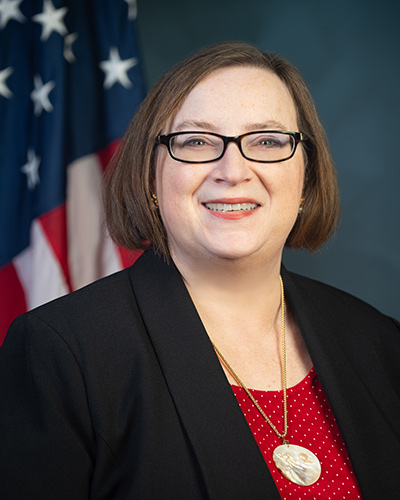Federal Housing Administration (FHA) Commissioner Julia Gordon once again offered the reverse mortgage industry a rock-solid commitment to the Home Equity Conversion Mortgage (HECM) program, describing it as an important tool to help seniors age in place in their own homes as long as they are able.
She described this commitment in a keynote address to the National Reverse Mortgage Lenders Association (NRMLA) Annual Meeting and Expo, taking place this week in Nashville, Tenn.
Demographic shift
In her opening remarks at the event, Gordon detailed how her husband’s recent birthday brought to mind a reality: this year, he turned 65.

“That makes him part of the approximately one in six Americans who are 65 or older,” Gordon said. “I bet most of you know that in 1988, when the HECM program was created, that proportion was only a little more than one in 10.”
The demographic shift helps illustrate the fact that America is aging, she explained.
“That’s 56 million people now, who as this room well knows, own over $12.2 trillion in home equity. But far too many of our seniors are not okay.”
In the wake of the COVID-19 pandemic, rising income inequality has been particularly harmful for seniors on fixed incomes, she explained. Eldercare options that can be considered “affordable” are profoundly lacking.
A commitment to the HECM program
Many who are nearing the traditional retirement age of 65 cannot afford to stop working, while mounting costs related to care in later life could place seniors in danger of losing their homes. But these realities also help to illustrate the purposes of the HECM program in particular, she said.
“[O]f people who have homes, we also know that practically all of them – according to some statistics I found, 92% – want to age in place in their own homes,” she said. “And helping seniors who want to remain in their homes for as long as they’re able is what FHA’s Home Equity Conversion Mortgage is all about.”
Within that reality is a commitment, she explained.
“That’s why I want to say on the front end clearly, once again this year as I did last year, that we in FHA are fully committed to the health, stability and broad availability of the HECM program,” she said to applause.
Gordon was confirmed for the role of FHA Commissioner by the U.S. Senate in May of 2022, and described to the attendees how her perspective on the HECM program has been shaped since then.
“In my year and a half in this position, I have come to appreciate both the crucial needs for this program and also the profound and daunting complexity of it,” she said. “I understand the serious challenges that are facing both HECM lenders and the borrower population with the leveling off of house price appreciation, and with the unprecedented rapid and steep increase in interest rates, everybody’s in uncharted territory right now.”
Finding ‘win-win-win’ policies
If any industry professionals doubted the commitment of government housing personnel and departments to the HECM program, Gordon sought to quash it.
“I’m here to let you know that we stay up at night when you do about all of this, and FHA is committed to working alongside you to navigate successfully to a stronger future,” she explained.
That means that FHA nd HUD examine HECM policy with a very precise lens, while also seeking to find policy solutions that Gordon calls “win-win-win.”
“[That means it’s] what makes programs work better for lenders, for borrowers, and for FHA all at the same time, and I’m always looking for those changes,” she said.
“We believe that the changes that we’ve made to the program in the last year — particularly things like the changes to the assignment claim process and changes to required documentation — we think those have increased efficiency for both lenders and for FHA, and directly address the liquidity challenges you face,” she said.
Other recent steps, including guidance for instances when FHA steps in to make borrower payments on behalf of a defaulted lender, are also designed to improve the situation for FHA and for borrowers specifically.
Gordon also praised the efforts of Ginnie Mae in improving liquidity for the HECM-backed Securities (HMBS) program, which Ginnie Mae President Alanna McCargo will address to conference attendees later in the event.





